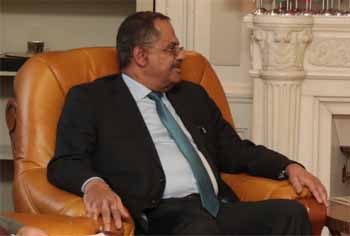
The Yemeni Ambassador to the UN in Geneva, Ali Majawar, says any peaceful resolution of the war in Yemen must restore the country’s legitimate authorities
- He is not optimistic that the Houthis will compromise. By Annegret Mathari, 27 Aug. 2018
The Yemeni government says the cause of the “tragedies” in the country is the “Coup d’état of the Houthi militias to oust the legitimate government on 21 September 2014”, the Yemeni Ambassador to the UN in Geneva, Ali Majawar, has told the press.
He said, “Any solution to the Yemeni issue must end the Coup d’état and restore the legitimate authorities, according to the terms of reference agreed upon locally, regionally and internationally.
These include the outcomes of the national dialogue, the Gulf Cooperation Council (GCC) initiative, its executive mechanism and relevant security council resolutions, especially UN Security Council Resolution 2216 which seeks to end Yemeni violence.
Any move to find a peaceful solution in Yemen that does not go from these terms of reference will not succeed, the causes of the war will persist and the suffering continue, Ambassador Majawar noted.
The Yemeni government is expecting the UN Special Envoy for Yemen, Martin Griffith, to take this into account for the peace consultations in Geneva.
The National Dialogue Conference was a transitional dialogue process held in Sana’a from March 2013 to January 2014, as part of the Yemeni crises reconciliation efforts.
The National Dialogue is a key part of the agreement brokered by the UN and the Gulf Cooperation Council that saw long-time President Ali Abdullah Saleh hand over power to the former vice president Abd Rabbuh Mansour Hadi in November 2011 after an uprising. (Mr. Hadi was subsequently sworn in for a two-year term as president in February 2012 after an election in which he stood unopposed.)
Support for Griffith’s Hodeida-Initiative
The Yemeni government supports every move that would end the Coup d’état and bring peace to Yemen, Ambassador Majawar said.
The government is supporting Mr. Griffith’s recent initiative for the Port and City of Hodeida, he added.
Griffith has since June been attempting to negotiate arrangements for the Port of Hodeida to be put under UN control.
Hodeida port is the main conduit for supplies to Yemen, where around 8.4 million people are believed by aid workers to be on the verge of starvation.
The Arab-led alliance launched an offensive on the town held by the Houthis on June 12 and says capturing Hodeida would cut off the main supply line of the Houthis and force the group to the negotiating table.
The Houthis have offered to hand over management of the port to the world body, according to the UN, but the coalition says the group must quit the western coast area.
In regard to the separatist Southern Movement, Ambassador Majawar said the focus must be on the results of the National Dialogue Conference, “because all of these movements” were part of that conference.
“Yemen is united as a federation as result of the National Dialogue Conference and we are going to implement these outcomes”, he added.
In 2015 the leaders of the Southern Movement allied themselves with the United Arab Emirates, which are supporting the Southern Transitional Council and in May they occupied the UNESCO-protected Socotra Island in May.
Difficult consultations
Regarding the peace consultations, which started on September 6, Ambassador Majawar viewed the consultations as difficult.
“We don’t think that the Houthis will give any compromise to help the consultations going forward,” he said.
He also criticized Iran for fueling the conflict in violation of the UN Security Council resolution 2216 (April 2015) accusing Teheran of having channeled missiles, mines and also drones to the Houthis.
Regarding the investigation of the air strike by the Saudi-led coalition on a bus in Dahyan market in the northern Houthi province Saada on 9 August, Ambassador Majawar said, the Eminent Group of Experts, established by the UN High Commissioner for Human Rights in December, is collecting information on all the violations of International Humanitarian Law in Yemen.
And there is also a Yemeni national commission of inquiry working on all violations, he said. “The coalition leadership is committed to investigate all these incidents.” Therefore the question had been directed to the joint incident assessment team.
After the results are available “they will decide, if there is another investigation or not”, he explained. The air strike in Sanaa killed 51 people, among them 40 children, and injured 79 people, including 56 children. UN Secretary General Antonio Guterres called for an independent and prompt investigation into this incident.
Ambassador Majawar reiterated that the coalition was not responsible for another attack, on 2 August on the port and the Al-Thawra hospital in Hodeida. According to him it was a mortar shell attack, carried out by the Houthis.
At least 41 civilians, including 6 children and 4 women, were killed and 111 others injured, among them 19 children and 3 women. Ambassador Majawar deplored, the attack in Hodeida received less international attention than the one in Sanaa
Article in publication (star-studded) with Diva International Magazine / International Diplomat Global





